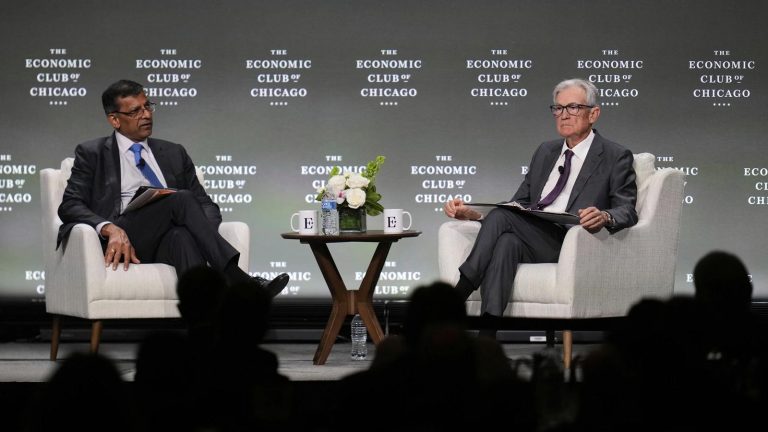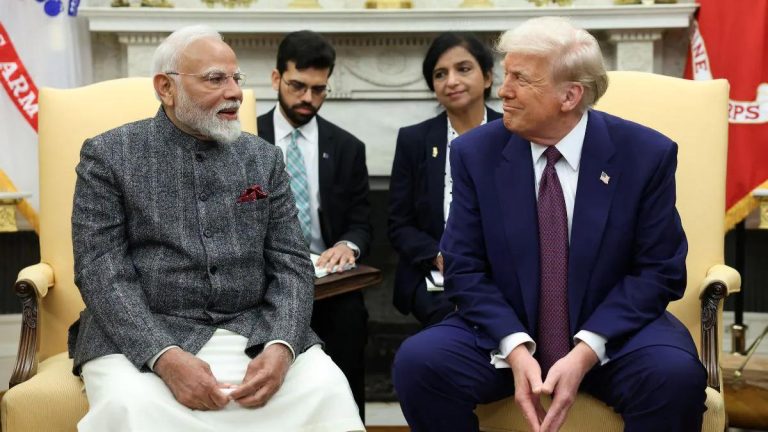
Germany Sounds Alarm Over Trump's Tariff Shock | Image Source: www.ft.com
BERLIN, Germany, 14 April 2025 – As tensions along the Atlantic escalate, Germany has issued a clear warning on the economic impact of the renewed tariff policies of US President Donald Trump. In a very strong monthly report, the German Ministry of Economy highlighted the growing threat of a slowdown in exports and industrial decline, highlighting an increasingly unstable world trade environment. With a free trade agreement between the United States and Europe that is being promoted by the German Chancellor pending Friedrich Merz, Berlin’s concerns reflect not only economic apprehension but also geopolitical concern about the future of transatlantic relations.
According to the report, German exports face “exceptionally high” uncertainty because Washington’s protectionist policies cast a long shadow on the largest European economy. This is not just speculation: the evidence is increasing in the reduction of demand, the reduction of order books and a troubled industrial vision. The warning underlines the interdependence of German prosperity with open markets, particularly with the US, its largest export destination outside the EU. According to the report, tariffs can trigger a “renewed and remarkable weakening” of industrial production, a sober forecast at a time when the world economy is already growing in uncertainty.
What motivates Germany’s economic warning?
The renewed concern stems largely from President Trump’s increasingly aggressive business attitude. Since his return to power, Trump has reinvigorated many of his first trade war tactics – tariffs, trade barriers and unilateral pressure – targeting in particular allies who profit from trade surpluses with US Germany, with their great dependence on car and machine exports, is once again in the spotlight.
According to the April report of the German Ministry of Economy, these tariffs already show signs of impact. Industrial production, which had shown signs of a slight rebound at the end of 2024, is expected to collapse again due to lower orders and lower world demand. The increased pressure of persistent inflation in the euro area and the additional weight of US protectionist policies produce a dangerous cocktail for German industry.
In an interview with Reuters, a German senior official stressed the need for a unified European response, saying that “the EU should not be left fragmented by Washington’s unilateral trade policies”. The grievor also cautioned against reprisals if discussions with the United States did not stabilize the situation. This indicates that tensions can soon go beyond economic rhetoric in political countermeasures of total blood.
Why does Friedrich Merz advocate a free trade agreement between the US and the EU?
Chancellor-in-Office Friedrich Merz is making headlines to relaunch calls for a global free trade agreement between the United States and the European Union, a vision that once had fun during Obama’s years but abandoned under Trump’s first mandate. Merz argues that such an agreement could serve as a buffer against economic volatility and reduce reliance on government-driven volatile trade policies.
In a recent speech, Merz said:
“The current trajectory of US trade policy leads to fragmentation, not cooperation. We must seize the opportunity to strengthen transatlantic economic unity through a fair and open trade agreement.”
However, Merz’s proposal is already facing tough resistance from Washington. The Trump administration expressed little interest in multilateral trade agreements, often portraying them as unfavourable to American workers. The White House’s cold response to Merz’s idea underscores the deep ideological abyss that still defines commercial diplomacy between the two economies.
How do German industries react?
Industry leaders in Germany do not imitate words. Several professional associations, including the Federation of German Industries (BDI), have publicly criticized US tariffs, warning that they could cause long-term damage to the export-oriented model of the country. According to an IDB statement, the automotive sector – which is already facing electrification challenges - is about to lose billions if U.S. vehicle and parts tariffs are applied or increased.
“It’s not just a political decision, it’s an economic earthquake,” said a spokesman for one of the leading German car manufacturers, speaking anonymously to protect corporate relations with American customers. This sentiment echoes all the export sectors in Germany, from chemicals and pharmaceuticals to precision machines, all of which depend on free access to the US market.
In more general terms, the report suggests that the effects of waves could stifle innovation and slow down investment in the industrial sector, while companies are preparing for more costly trade routes and reducing competitiveness in the US market. These are not short-term concerns: they indicate a possible structural erosion of Germany’s industrial advantage if trade restrictions persist.
Is this really a financial crisis on the horizon?
Chancellor Merz has gone so far as to warn that the current path could trigger a financial crisis. This may seem alarmist, but the underlying mechanisms justify concern. If German exports decline considerably, the negative effects could be serious: lower corporate income, job losses, lower tax revenues and downward pressure on consumer spending.
The German banking sector, with its exposure to export industries, could also be affected. Banks such as Deutsche Bank and Commerzbank, which already operate in a low-level environment, could face growing defaults or credit risks if manufacturers begin to hesitate under prolonged trade restrictions. And as the European Central Bank is already cautious about rising rates too fast, policymakers have limited tools to counter the fall in trade.
Therefore, while the term “financial crisis” may seem dramatic, the contours of systemic risk are being developed, especially if trade policies of retaliation turn a cold tariff war into an economic confrontation of all kinds.
What does this mean for global supply chains?
Tariff scales rarely work in vacuum. According to data from the Hamburg port authority, the shipping volume already shows signs of contraction, especially for transatlantic routes. The Panamanian “Over Goods”, which was docked in Hamburg earlier this year, symbolizes Germany’s high consumption position in world trade. Port officials noted that fewer shipments to the United States, particularly for industrial products, were planned for a disturbing signal for logistics companies and exporters.
As bottlenecks and red tape increase, companies can use other trade routes or even on the ground certain production elements. But these transitions are costly and waste a lot of time. At present, the most likely result is higher prices, longer delivery times and increased volatility in supply chains, which affect both consumers and businesses.
Are there broader geopolitical implications?
Sure. The disruption of trade ties also has strategic consequences. The European Union, already under pressure from internal disagreements and external pressures, can see a greater divergence in the way in which Member States manage relations with the American countries most dependent on the US markets, such as Germany, the Netherlands and Poland, may disagree with others who advocate stronger intra-European trade or closer ties with Asia.
In addition, Trump’s tariff policies can encourage Germany and the EU to strengthen their trade relations with China, an axis that carries its own risks through increased global competition and technological decoding. As Martin Wolf of the Financial Times recently pointed out, “Today’s trade policy is no longer just about the economy, but about the projection of power.” This reality lies in Berlin, Brussels and beyond.
The possibility of a fragmented world order is greater when multilateralism leaves room for a policy of compromise. Germany’s willingness to reach an agreement between the US and the EU may be one of the last diplomatic efforts to reverse this trend.
In short, Germany’s alarm bell is not just about commercial tariffs or measures. It is a sign of deeper fractures in the global economic architecture, where confidence, openness and stability, long considered pillars of transatlantic trade, are reassessed in real time. Whether or not this leads to a crisis will depend on what is happening in Washington and Brussels.



